Mark Shuttleworth from South Africa, the second space tourist in the world, wants to compete with the American software giant and offer free software that should make the Internet accessible to millions in Africa and developing countries around the world
The science service

Mark Shuttleworth from South Africa has already conquered outer space. Now he wants to conquer the Internet in developing countries, while competing with Microsoft. Shuttleworth made his fortune when he sold an Internet company he founded in Cape Town. Later he paid 20 million dollars to become the second space tourist in the world, and the first African to circle the Earth from space. Now Shuttleworth wants to compete with the American software giant and offer free software that should revolutionize the way computers are used, and make the Internet accessible to millions in Africa and developing countries around the world. "Open source is the platform of the future," says Shuttleworth. "It will sweep the Internet network like a huge wave."
Shuttleworth's Ubuntu package is based on the open source Linux operating system, and includes software with strange names such as Hoary Hedgehog or Warty Warthog. The African term Ubuntu means caring for community and humanity, and the way to use the package should be simpler than in conventional Linux systems. Last year, PC World magazine named the Ubuntu suite one of the best products of the year, ranking it 26th, above Apple's iTunes music service, for example, which ranked 34th.
The government offices of Brazil, China, Spain, India and Malaysia already use Linux systems, and according to Shuttleworth, free software may save the expenses of running computers in schools, community centers and private homes on the African continent. The free software can also save expenses for small businesses in Africa, the poorest continent in the world, where only a very small percentage of the population is computer literate.
Open source may be very successful in Africa, because government computing in many countries will start from scratch, and users have not yet gotten used to proprietary software, such as Microsoft's Windows. "The open source is offered for free and allows information to be shared very quickly," says Shuttleworth. "If the children learn to use the software at school and can download it at home, they will be able to show it to their parents and friends and teach them to use it as well."
However, Microsoft does not intend to sit idly by, and is already fighting back. The computer giant is financing technology centers in 284 local authorities in Africa, as part of a project that may reach half a million poor residents. Microsoft CEO Steve Ballmer rejects claims that expensive proprietary software could harm access to computers in poor countries. According to him "freedom of choice is better than open source".
South Africa, the richest country on the continent, "warmly supports", according to her, open source software, but since the country is satisfied that Microsoft finances the technology centers and offers computers to schools, it does not rule out the use of the proprietary software. At the beginning of the year, Microsoft launched a Zulu language version of the Windows XP operating system, and soon it is going to launch versions in the Afrikaans and Satswana languages as well.
According to Gordon Fraser, the local director of Microsoft, these measures are not intended to block competition from the open source direction, but he admits that versions in local languages give priority in contacts with the administration. "It is clear to us that since South Africa has 11 official languages, we must support these languages in order to work with the government."
To the GO OPEN TV show that Shettleworth sponsored, and all episodes of which can also be downloaded (And thanks to Guy Shafer for the link)
https://www.hayadan.org.il/BuildaGate4/general2/data_card.php?Cat=~~~594590083~~~85&SiteName=hayadan
